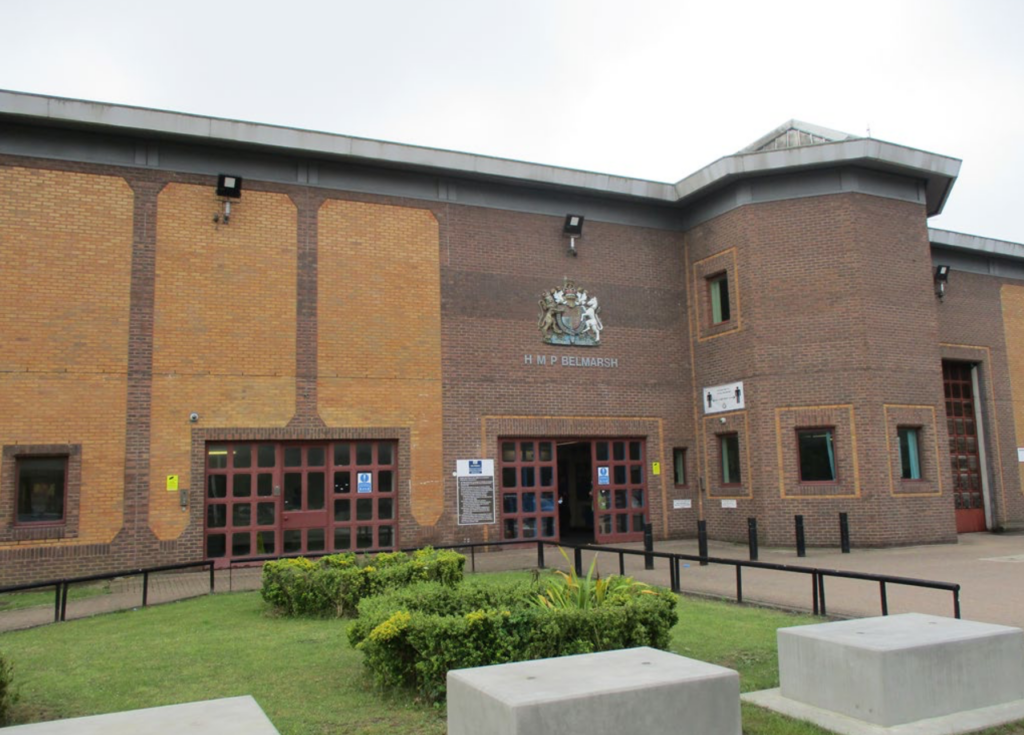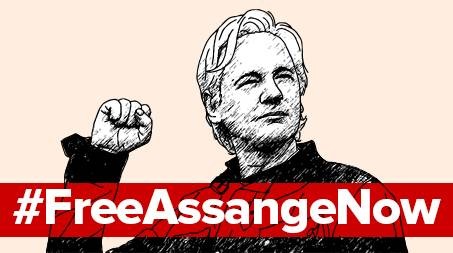Five Years at Belmarsh: A Chronicle of Julian Assange’s Imprisonment
JUSTICE, 15 Apr 2024
Kevin Gosztola | The Dissenter – TRANSCEND Media Service
Calls for Assange’s freedom are renewed as the WikiLeaks founder marks five years in Belmarsh prison.
11 Apr 2024 – At the behest of the United States government, the British government has detained WikiLeaks founder Julian Assange in His Majesty’s Prison Belmarsh for five years.
Assange is one of the only journalists to be jailed by a Western country, making the treatment that he has endured extraordinary. He has spent more time in prison than most individuals charged with similar acts.
Since December 2010, Assange has lived under some form of arbitrary detention.
He was expelled from Ecuador’s London embassy on April 11, 2019, and British police immediately arrested him. Police transported Assange to Belmarsh, a maximum-security facility often referred to as “Britain’s Guantanamo.”
Around the same time, the U.S. Justice Department unsealed an indictment that alleged that Assange had conspired with U.S. Army whistleblower Chelsea Manning to commit a “computer intrusion.” The following month the DOJ issued another indictment with 17 additional Espionage Act charges.
2019
On May 1, Assange was sentenced by a British court to 50 weeks in prison as punishment for seeking political asylum from Ecuador while Sweden was attempting to extradite him. His sentence was longer than the six-month sentence that Jack Shepherd, the “speedboat killer” received for “breaching bail.”
UN Special Rapporteur on Torture Nils Melzer visited Assange on May 9. Two medical experts, who specialize in examining potential torture survivors, accompanied Melzer. He reported on May 31 that “Assange showed all [the] symptoms typical for prolonged exposure to psychological torture, including extreme stress, chronic anxiety and intense psychological trauma.”
A few weeks after Melzer’s visit, prison administrators moved Assange to the medical ward. A WikiLeaks spokesperson said that their former editor-in-chief’s health had “continued to deteriorate,” and he had “dramatically lost weight.” A defense lawyer indicated that it had become impossible to “conduct a normal conversation with him.”
Australian journalist John Pilger, a friend and supporter of Assange, shared, “When I saw him a couple of weeks ago he wasn’t very well then. But then he’s been in an embassy in a confined space without natural light for almost seven years.”
“He needs a great deal of diagnostic care and rehabilitation. He’s gone through an extraordinary physical and mental ordeal. And now he’s having to go through this,” Pilger added.
Assange completed his prison sentence in September, however, District Judge Vanessa refused to release him on bail because she believed he would “abscond again.”
Former British ambassador Craig Murray attended a hearing at Westminster Magistrates Court on October 21, 2019, and shared what he witnessed.
“I was badly shocked by just how much weight my friend has lost, by the speed his hair has receded and by the appearance of premature and vastly accelerated aging. He has a pronounced limp I have never seen before. Since his arrest he has lost over 15 kg [33 pounds] in weight.”
Murray continued, “When asked to give his name and date of birth, he struggled visibly over several seconds to recall both.”
“I do not understand how this process is equitable,” Assange declared. “This superpower had 10 years to prepare for this case, and I can’t even access my writings. It is very difficult, where I am, to do anything. These people have unlimited resources.”
According to Murray, it was a “real struggle” to address the court. “[H]is voice dropped and he became increasingly confused and incoherent. He spoke of whistleblowers and publishers being labeled enemies of the people, then spoke about his children’s DNA being stolen and of being spied on in his meetings with his psychologist. I am not suggesting at all that Julian was wrong about these points, but he could not properly frame nor articulate them.”
“He was plainly not himself, very ill and it was just horribly painful to watch. Baraitser showed neither sympathy nor the least concern. She tartly observed that if he could not understand what had happened, his lawyers could explain it to him, and she swept out of court,” Murray added.
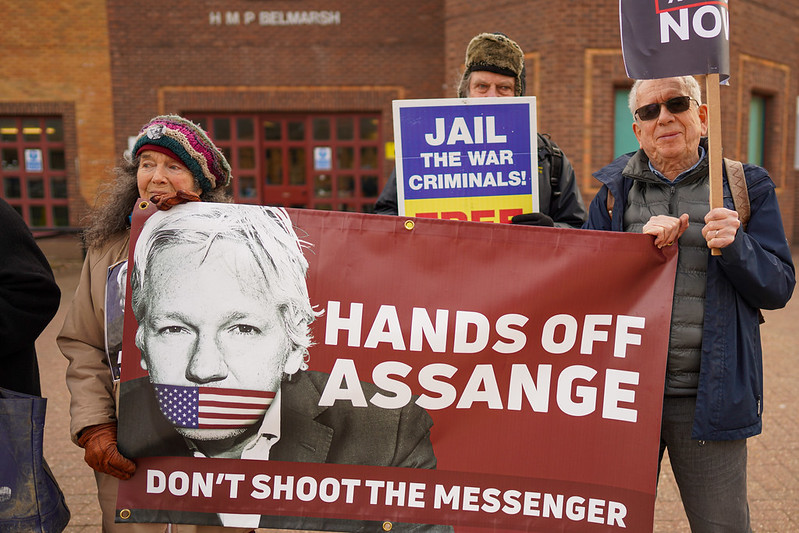
2020
Assange remained in Belmarsh prison’s medical ward until mid-January. During that time, he lived in conditions that amounted to solitary confinement. The harsh confinement ended only after his legal team and several prisoners petitioned administrators to move him into a wing with other prisoners.
In February, the first of two hearings on the U.S. extradition request were held. The proceedings focused on matters of extradition law, and Assange’s attorneys complained about alleged abuse after the first day.
SBS Australia reported, “The WikiLeaks founder was stripped naked twice, handcuffed 11 times and had his legal case files confiscated by guards at London’s Belmarsh Prison on Monday, his lawyers told the hearing.”
District Judge Vanessa Baraitser claimed there was nothing that she could do to ensure Assange was treated humanely.
Assange was forced to observed proceedings in his own case from within a glass box. Jen Robinson, one of Assange’s attorneys, said that he was “unable to pass notes in a confidential and secure way. He’s unable to seek clarification from his legal team and give instructions during the course of the proceedings.”
It was difficult for Assange to participate in his defense, and yet, Baraitser denied a request to allow him to sit with his attorneys in the courtroom.
Not long after the week-long hearing, the COVID-19 pandemic shut down the majority of the world. It greatly intensified the hardship of imprisonment.
Vaughan Smith, a friend who allowed Assange to live with him under house arrest in 2010, wrote on April 9 that Assange was “confined alone in a cell 23 and a half hours every day. He gets half an hour of exercise and that is in a yard crowded with other prisoners. With over 150 Belmarsh prison staff off work self-isolating, the prison is barely functioning.”
“We know of two COVID-19 deaths in Belmarsh so far, though the [Ministry] of Justice have admitted to only one death. Julian told me that there have been more, and that the virus is ripping through the prison,” Smith said.
On March 25, Assange’s legal team went before Baraitser and asked that he be granted bail. There were widespread calls for the release of detainees and prisoners in order to halt the spread of COVID. But Baraitser denied the request.
Belmarsh did not allow visitors from March 22 to the last week of August. He was unable to see his partner Stella or his two children, Gabriel and Max.
When Stella visited Julian, he was not allowed to hug his children unless he wanted to be in solitary confinement for two weeks.
“Julian said it was the first time he had been given a mask because things are very different behind the doors,” Stella shared. “[H]e looked a lot thinner. He was wearing a yellow armband to indicate his level of prisoner status, and you could see how thin his arms were.”
The U.S. Justice Department issued another indictment in June that added to Julian Assange’s stress by accusing the WikiLeaks founder of conspiring with “hackers” affiliated with “Anonymous,” “LulzSec,” “AntiSec,” and “Gnosis.” Some of the new allegations were sourced to Sigurdur “Siggi” Thordarson—a serial criminal, lying sociopath, and convicted pedophile.
Although the pandemic impacted public and press access to proceedings, Baraitser went forward with the second part of the extradition hearing in September. Assange’s legal team called several witnesses to help challenge the extradition request. It lasted a month.
Dr. Quinton Deeley, who works for the National Health Service (NHS), conducted an Autism Diagnostic Observation Schedule (ADOS) test and interviewed Assange for six hours in July. He was diagnosed with Asperger’s syndrome.
Assange told Deeley he feared he would be held in isolation in a U.S. prison. He was afraid of the fresh indictment. He was also concerned about the fate of Joshua Schulte, who was held in harsh confinement conditions prior to his trial for disclosing the “Vault 7” materials to WikiLeaks.
If extradited, Deeley determined Assange’s risk of suicide would be high under the circumstances. He said Assange “ruminates about prospective circumstances at length,” and it causes a “sense of horror.” And, “He would find it an unbearable ordeal, and I think his inability to bear that in the context of [an] acute worsening depression would confer high risk of suicide.”
A couple of months later, on November 2, Manoel Santos, a gay Brazilian who was facing deportation to Brazil, killed himself. He was a prisoner who had become Assange’s friend, and his death was incredibly devastating for Assange.
“Julian tells me Manoel was an excellent tenor,” Stella Assange shared. “He helped Julian read letters in Portuguese and he was a friend. He feared deportation to Brazil after 20 years, being gay put him at risk where he was from,” she said. (Jair Bolsonaro, an anti-gay fascist, was president of Brazil.)
There was also a COVID outbreak in Assange’s prison block in November. “I am extremely worried about Julian. Julian’s doctors say that he is vulnerable to the effects of the virus. But it’s not just COVID,” Stella declared.
She added, “Every day that passes is a serious risk to Julian. Belmarsh is an extremely dangerous environment where murders and suicides are commonplace.”
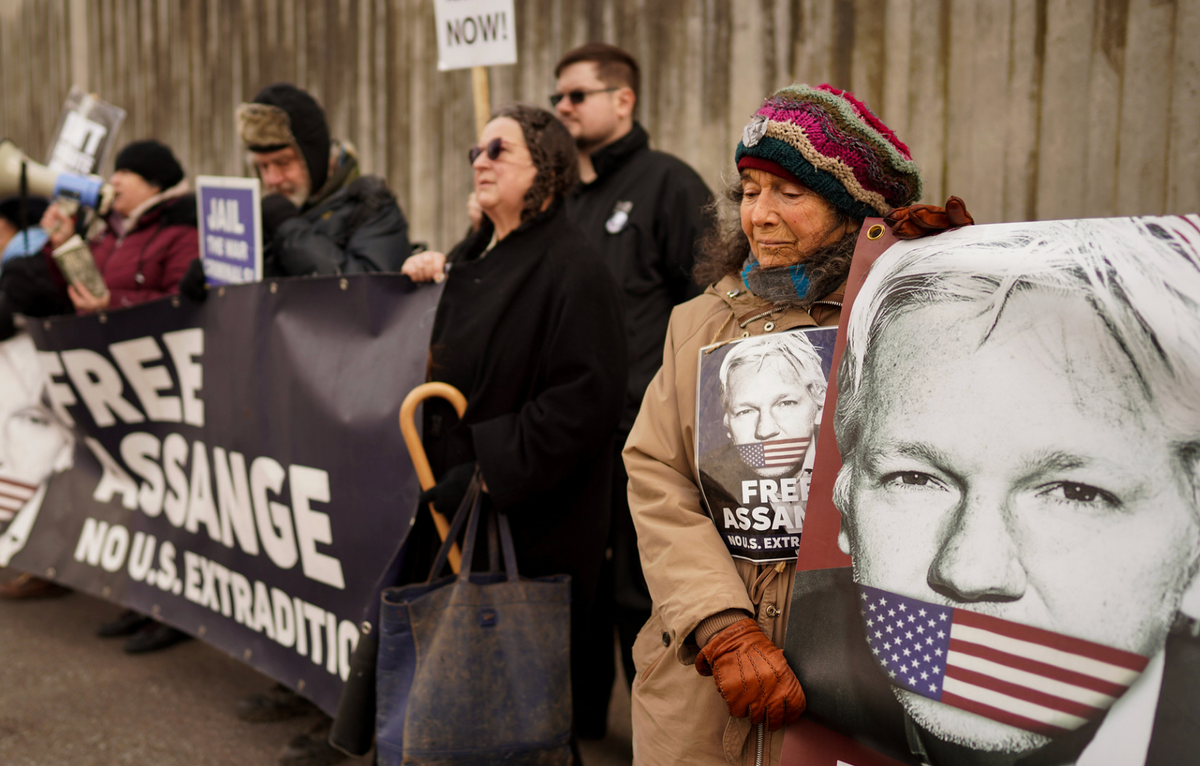
2021
The year at Belmarsh started with a bittersweet victory. District Judge Vanessa Baraitser ruled that extraditing Julian Assange to the United States would be “oppressive” for mental health reasons.
Although Baraitser refused to uphold certain protections that would protect Assange’s freedom of expression, the judge acknowledged the cruelty of the U.S. prison system, particularly what would happen to Assange if he was sent to a supermax prison.
But two days later, lawyers from the Crown Prosecution Service argued Assange should not be granted bail because he helped NSA whistleblower Edward Snowden “flee justice.” Lawyers also singled out Mexican President Andres Manuel Lopez Obrador’s asylum offer and insisted that he remain in Belmarsh or else he would go to Mexico’s London embassy to escape prosecution.
The district judge sided with the U.S. government. She agreed that the assistance WikiLeaks provided Snowden demonstrated that Assange would pose a “flight risk.” Baraitser further argued that the “huge support networks” that Assange had would aid him “should he again choose to go to ground.” Supporters would make it easier for the WikiLeaks founder to evade prosecution.
Following President Joe Biden’s election, Stella was cautiously optimistic that his administration would have want to “project a commitment to the First Amendment.” This would force the U.S. Justice Department under Biden to drop the charges. However, the Biden administration would not relent in their pursuit of the case.
Contagious variants of COVID spread throughout the world. For eight months, Belmarsh administrators would not permit Stella or his two children to visit Julian.
Stella told the news media after her prison visit that British authorities needed to bring this case to an end because they were “driving” Julian to “deep depression and into despair.”
“[Julian] shouldn’t be in prison at all, he shouldn’t be prosecuted at all, because he did the right thing: he published the truth,” Stella declared.
His Majesty’s Chief Inspector of Prisons made two unannounced visits to Belmarsh in late July 26-27 and early August. A report [PDF] published by the inspector found that “rates of violence” had spiked despite COVID restrictions “limiting the time most prisoners were out of their cells.”
“The prison had not paid sufficient attention to the growing levels of self-harm and there was not enough oversight or care taken of prisoners at risk of suicide. Urgent action needed to be taken in this area to make sure that these prisoners were kept safe,” according to the report.
A hearing on the U.S. government’s appeal was held before the British High Court of Justice at the end of October. Assange had a “mini-stroke” on the first day and was unable to follow proceedings.
On December 10, the High Court ruled in favor of the U.S. government’s appeal and overturned the lower court decision that had momentarily spared Assange. The judges said they were “satisfied” with diplomatic assurances that were offered by the U.S. State Department. The court had no reason to believe that Assange would not be treated appropriately in U.S. custody.
Assange immediately appealed to the United Kingdom’s Supreme Court to reconsider the decision.
“Today is international Human Rights Day,” Stella declared. What a shame. How cynical to have this decision on this day, to have the foremost publisher [and] journalist of the past 50 years in a U.K prison accused of publishing the truth about war crimes, about CIA kill teams.”
“In fact, every time we have a hearing, we know more about the abusive nature, the criminal nature of this case.”
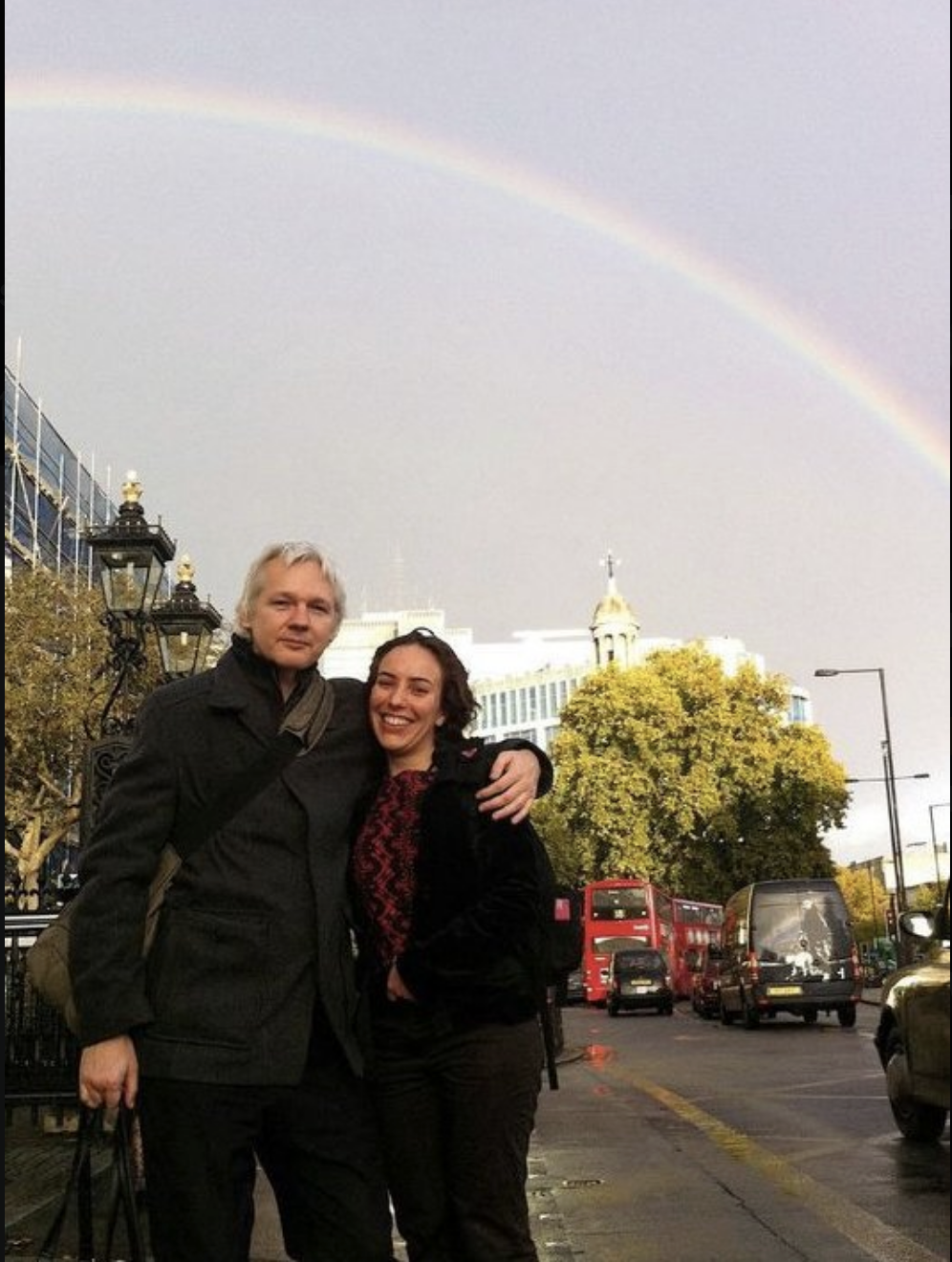
2022
Another bittersweet moment in the case occurred at Belmarsh on March 23. Prison administrators ended their opposition and allowed Julian and Stella to marry each other in a pared-down wedding ceremony.
Stella proclaimed, “This is not a prison wedding, it is a declaration of love and resilience in spite of the prison walls, in spite of the political persecution, in spite of the arbitrary detention, in spite of the harm and harassment inflicted on Julian and our family. Their torment only makes our love grow stronger.”
However, the United Kingdom’s Ministry of Justice refused to allow journalists Craig Murray and Chris Hedges to attend as witnesses because they regularly publish articles about the case. The prison also tried to deny access to the couple’s “proposed photographer” and labeled wedding pictures a “security risk” because the photos could circulate on social media or in the press.
“I am convinced that they fear that people will see Julian as a human being. Not a name, but a person,” Stella responded. “Their fear reveals that they want Julian to remain invisible to the public at all costs, even on his wedding day, and especially on his wedding day,” Stella responded.
Still, as Stella told 60 Minutes Australia, the two exchanged vows and hugged. “It was like we weren’t in a prison. For a moment, the prison walls disappeared. The guards and the prisoners and the visitors were all saying congratulations, and when Julian came in as well, they started clapping.”
Julian Assange’s appeal to the U.K. Supreme Court was rejected days before wedding. The court was unwilling to review any of the issues that his legal team raised. That meant the extradition request was approved by the district court and sent to U.K. Home Secretary Priti Patel for approval in June.
A new appeal was filed in July, and as Assange sought an appeal hearing before the High Court, his case was thrust into limbo.
In October, Assange was forced to isolate in the prison for several days after he was infected with COVID. He was locked in his cell for 24 hours a day.
The news was shared a couple days after Stella Assange and supporters formed a human chain around U.K. Parliament in a show of solidarity for the jailed WikiLeaks founder.

2023/2024
While the Australian government had consistently declined to advocate for the rights of one of their own citizens, Stephen Smith, who was Australia’s high commissioner to the United Kingdom, visited Julian Assange at Belmarsh.
“I’m very keen just to have a conversation with him, check on his health and wellbeing and hopefully see whether regular visits might be a feature of the relationship with Mr Assange going forward,” Smith told the press, as he entered the prison.
The visit was a product of campaigning by Assange supporters in Australia. Finally, the prime minister of Australia—a close U.S. ally—was publicly demanding that the case against Assange end.
A similar visit by Reporters Without Borders (RSF) Secretary-General Christophe Deloire and Director of Operations Rebecca Vincent was blocked by Belmarsh administrators on the same day. RSF was stunned because they had coordinated with the prison.
“Prison officials told the RSF representatives that they had ‘received intelligence’ that they were journalists, and would therefore not be allowed in, per a decision of Belmarsh Prison Governor Jenny Louis. The Governor did not respond to urgent requests to meet Deloire and Vincent or to otherwise intervene to allow their access,” RSF shared.
In May, the first public letter from Assange since he was confined at Belmarsh was shared. The jailed WikiLeaks founder satirically welcomed King Charles to the British throne and encouraged Charles to visit his prison.
“As a political prisoner, held at Your Majesty’s pleasure on behalf of an embarrassed foreign sovereign, I am honored to reside within the walls of this world class institution. Truly, your kingdom knows no bounds, Assange wrote.
“During your visit, you will have the opportunity to feast upon the culinary delights prepared for your loyal subjects on a generous budget of two pounds per day. Savor the blended tuna heads and the ubiquitous reconstituted forms that are purportedly made from chicken. And worry not, for unlike lesser institutions such as Alcatraz or San Quentin, there is no communal dining in a mess hall. At Belmarsh, prisoners dine alone in their cells, ensuring the utmost intimacy with their meal.”
“Venture further into the depths of Belmarsh and you will find the most isolated place within its walls: Healthcare, or “Hellcare” as its inhabitants lovingly call it,” Assange added. “Here, you will marvel at sensible rules designed for everyone’s safety, such as the prohibition of chess, whilst permitting the far less dangerous game of checkers.”
Assange described the “Belmarsh End of Life Suite,” where prisoners cry, “Brother, I’m going to die in here,” and the crows nesting on the razor wire along with “the hungry rats that call Belmarsh home.”
“If you come in the spring, you may even catch a glimpse of the ducklings laid by wayward mallards within the prison grounds. But don’t delay, for the ravenous rats ensure their lives are fleeting.”
On June 8, the British High Court of Justice ruled against Assange’s request for an appeal. The court decision, which inexplicably took nearly a year to be issued, was authored by Judge Sir Jonathan Swift and contained little explanation for the denial.
That forced Assange’s legal team into one more phase of limbo as they re-submitted an abbreviated appeal and waited for the court to grant a hearing.
Journalist Charles Glass visited Assange on December 13. He last met with Assange six years ago while he was still in Ecuador’s London embassy.
In a report for The Nation, Glass wrote, “His paleness is best described as deathly,” and the reason he looks so unwell is because he has not seen the sun since he was transported to the prison on April 11, 2019.
“Warders confine him to a cell for 23 out of every 24 hours. His single hour of recreation takes place within four walls, under supervision.”
The food that is available at Belmarsh consists of “porridge for breakfast, thin soup for lunch, and not much else for dinner.”
“Belmarsh’s warders shove the food into the cells for prisoners to eat alone. It is hard to make friends that way. He has been there longer than any other prisoner apart from an old man who had served seven years to his four and a half,” Glass additionally reported.
The prison opposed Assange’s request for a radio until Glass stepped in to help pressure the prison.
One of the few bright spots, however, is that Assange has been allowed to maintain a library with dozens upon dozens of books in his cell. In fact, when Glass visited, he could no longer receive books because he had 232 books.
At the end of December and in early January, Assange was ill. He suffers from osteoporosis and coughing resulted in a broken rib. If prison authorities allowed him some access to sunlight, the 52-year-old publisher may not be so frail.
Assange was still unwell when an appeal hearing was finally held in February and did not attend the proceedings.
The High Court partly ruled in Assange’s favor on March 26, when it recognized that Assange had valid grounds for an appeal. But the High Court stayed the decision and urged the U.S. government to submit “assurances” that would help the government avoid an appeal.
Assange was once again punished by the legal process. He has very few options left to prevent extradition to the U.S. for an unprecedented trial on Espionage Act charges.
Around the fifth anniversary, President Joe Biden was asked by a reporter about the Assange case. Biden said he was “considering” Australia’s request to end the case—whatever that means for one of the best known political prisoners in the world.
___________________________________________
Kevin Gosztola is Editor for The Wide Shot, Journalist, film/video college graduate, and movie fan. Member of Society of Professional Journalists (SPJ).
Go to Original – thedissenter.org
Tags: Activism, Assange, Belmarsh Prison, Belmarsh Tribunal, Big Brother, Cryptome, Ecuador, Human Rights, John Young, Journalism, Justice, Media, Surveillance, Sweden, Torture, UK, UN, USA, Violence, Whistleblowing, WikiLeaks
DISCLAIMER: The statements, views and opinions expressed in pieces republished here are solely those of the authors and do not necessarily represent those of TMS. In accordance with title 17 U.S.C. section 107, this material is distributed without profit to those who have expressed a prior interest in receiving the included information for research and educational purposes. TMS has no affiliation whatsoever with the originator of this article nor is TMS endorsed or sponsored by the originator. “GO TO ORIGINAL” links are provided as a convenience to our readers and allow for verification of authenticity. However, as originating pages are often updated by their originating host sites, the versions posted may not match the versions our readers view when clicking the “GO TO ORIGINAL” links. This site contains copyrighted material the use of which has not always been specifically authorized by the copyright owner. We are making such material available in our efforts to advance understanding of environmental, political, human rights, economic, democracy, scientific, and social justice issues, etc. We believe this constitutes a ‘fair use’ of any such copyrighted material as provided for in section 107 of the US Copyright Law. In accordance with Title 17 U.S.C. Section 107, the material on this site is distributed without profit to those who have expressed a prior interest in receiving the included information for research and educational purposes. For more information go to: http://www.law.cornell.edu/uscode/17/107.shtml. If you wish to use copyrighted material from this site for purposes of your own that go beyond ‘fair use’, you must obtain permission from the copyright owner.
